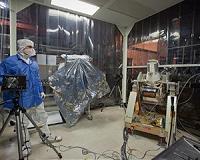 |
Washington (AFP) March 6, 2011 A pair of costly satellite crashes have dealt a major blow to NASA's earth science efforts just as the US space agency faces scrutiny from Congress over whether climate science should be part of its focus at all. The $424 million Glory satellite to monitor aerosols and the sun's power plunged into the Pacific on Friday shortly after launch, just two years after a similar satellite to study carbon dioxide in the atmosphere met the same fate. "The loss of the Glory satellite is a tragedy for climate science," said Bruce Wielicki, senior scientist for earth science at NASA's Langley Research Center. "The time to heal a lost space mission is typically three to seven years depending on budgets and how many spare parts remain from the last instrument builds," he said. Both NASA and the rocket maker, Orbital Sciences Corp, have launched investigations into why the protective nose-cone, or fairing, failed to separate, weighing down the satellite and preventing it from reaching orbit. "It's not like we have spares on the shelf," said Glory program scientist Hal Maring, adding that the advanced instruments on board would have offered detailed data in an area that desperately needs more study. "The effect of aerosols is the place where our uncertainty is greatest in terms of being able to understand and predict climate," he told AFP. Perhaps that's why the loss hurts most, because Glory "was directed very specifically at the place where our knowledge was weakest," he said. Glory's crash came just hours after NASA administrator Charles Bolden finished two days of testimony before lawmakers, defending the US space agency's plans for the future of human spaceflight and climate science. President Barack Obama's 2012 budget, which has yet to be approved by Congress, calls for a 25 percent increase in NASA's budget for earth science, bringing the total to $1.8 billion of NASA's overall $18.7 billion budget. But some Republicans, who hold a majority in the House of Representatives, want to see NASA give up climate science so it can focus on returning astronauts to space once the 30-year-old shuttle program ends later this year. "NASA's primary purpose is human space exploration and directing NASA funds to study global warming undermines our ability to maintain our competitive edge in human space flight," said Republican Congressman Bill Posey last month. Earth science has been a distinct mission of NASA ever since Congress formed the agency with the 1958 Space Act, setting its first objective as "the expansion of human knowledge of the earth and of phenomena in the atmosphere and space." Further revisions of the Space Act in 1976 gave NASA "authority to carry out stratospheric ozone research," and a 1984 change broadened NASA's earth science authority from the stratosphere to "the expansion of human knowledge of the Earth." But budget squeezes have crippled NASA's efforts since the 1990s, when NASA first set out to create a global Earth observing system and budget deficits forced engineers to scale back to one third of their original plan, according to Wielicki. "What we have now are pieces of that system that have lived well beyond their design life," he said. "Space missions are expensive by nature, risky by nature, and our nation has decided not to spend the kind of resources it would take for a more robust set of climate research observations." Rocket launch failures happen in other countries too. In December, three Russian satellites crashed into the Pacific Ocean after their rocket couldn't reach orbit. The same month, an Indian rocket on a mission to launch a communications satellite exploded less than a minute after takeoff. But such setbacks should not deter scientists' efforts to gain knowledge of climate through space observations, said astrophysicist Ray Weymann. "There is no getting around the fact that the type of data Glory was to get must really be done from space," Weymann said. "So, if not NASA, who else? NOAA (the National Atmospheric and Oceanic Administration) really has not been the agency in charge of satellite climate science, though of course they are involved in using the data. "It seems to me that either the US, which is by far the leader in these efforts, cedes this critical science to ESA (European Space Agency), Japan and others, or NASA continues in this effort and corrects what needs correcting."
Share This Article With Planet Earth
Related Links Earth Observation News - Suppiliers, Technology and Application
 New Day Dawns For Satellite To Study Earth's Ozone Layer
New Day Dawns For Satellite To Study Earth's Ozone LayerHampton VA (SPX) Mar 04, 2011 After nine years in a clean room, an instrument that studies the Earth's atmosphere and protective ozone layer has been returned to service. NASA's Stratospheric Aerosol and Gas Experiment III-ISS (SAGE III-ISS) will measure ozone, water vapor and aerosols in the atmosphere when it is attached to the International Space Station (ISS) three years from now. The instrument is scheduled for l ... read more |
|
| The content herein, unless otherwise known to be public domain, are Copyright 1995-2010 - SpaceDaily. AFP and UPI Wire Stories are copyright Agence France-Presse and United Press International. ESA Portal Reports are copyright European Space Agency. All NASA sourced material is public domain. Additional copyrights may apply in whole or part to other bona fide parties. Advertising does not imply endorsement,agreement or approval of any opinions, statements or information provided by SpaceDaily on any Web page published or hosted by SpaceDaily. Privacy Statement |